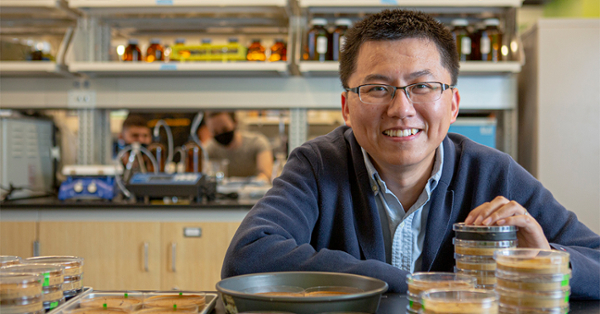Gaming to improve geotechnical engineering education—and broaden diversity
Gaming to improve geotechnical engineering education—and broaden diversity

A new research project at Rowan University’s Center for Research and Education in Advanced Transportation Engineering Systems (CREATES) aims to teach students real-world geotechnical engineering concepts and attract diverse candidates to the field using interactive video games.
Called MERGE (Multiphysics Enriched Mixed Reality for Integrated Geotechnical Education), the project is led by Dr. Cheng Zhu, an assistant professor in the Department of Civil and Environmental Engineering; Dr. Ying (Gina) Tang, an expert in serious games and professor in the Department of Electrical and Computer Engineering; Dr. Sarah Ferguson, an assistant professor in the College of Education; Dr. Sarah Bauer, an assistant professor in the Department of Civil and Environmental Engineering; as well as collaborator Dr. Lei Wang, assistant professor of geotechnical engineering at the University of the District of Columbia, a historically Black college and university. The study is supported by a $299,210 grant from the National Science Foundation.
While college civil engineering programs nationwide focus on concepts like soil mechanics and geotechnical engineering, some course content and textbooks don’t reflect emerging technology and research methods. MERGE games will include real-world scenarios students are likely to encounter in internships and careers in the geotechnical engineering field.
Because the games are computer-based, students don’t need access to a lab or expensive equipment, making the learning scenarios accessible anytime and anywhere. It is expected that such authentic, fun and engaging play in games will promote learning.
“Most universities don’t really use games to teach students, especially in our field,” Zhu said. “When we design these games, we want to make it very different from the current efforts.”
The game’s theme is GeoSmart City, with challenges and tasks designed to feature applications of geotechnical engineering in an urban setting. The virtual city in the game is inspired by Philadelphia and Washington, D.C., both near the participating universities and with large minority populations. The games will help create engineering solutions for underserved communities using sustainable design.
One of the game’s main modules asks players to extract geothermal energy by designing a geothermal energy pile, an environmentally friendly energy source that uses the Earth’s heat as energy. The other main game task is to assess the conditions of soil and rock slopes (like levees or slopes near a roadside) and develop options for slope reinforcement. “Through this game, students can virtually experience how people complete or perform those field works,” Zhu said.
The games are under development and will be used by students taking the undergraduate geotechnical engineering core course at both universities starting fall 2022.
The goal of the games, Zhu said, is for students to learn real-world concepts in a virtual environment and out of the textbook. Zhu and his team will be studying students’ learning, comparing those who have played the games to those who have not.
By presenting students with an accurate depiction of contemporary geotechnical engineering field work early in their education, Zhu hopes more diverse candidates will specialize in the discipline.
“I want more diverse students to choose geotechnical engineering as their career,” Zhu said.